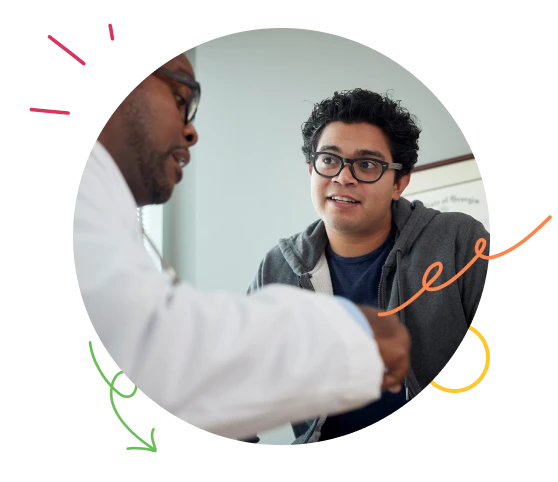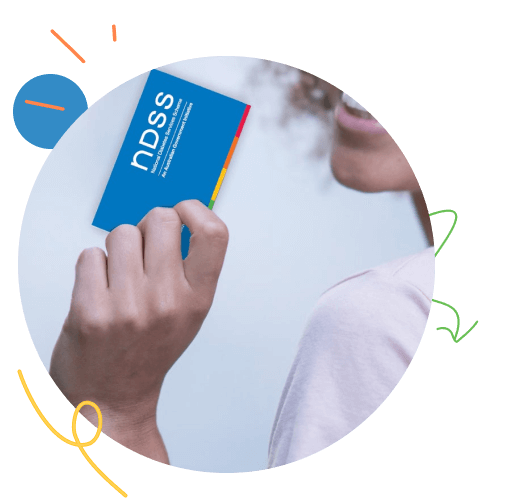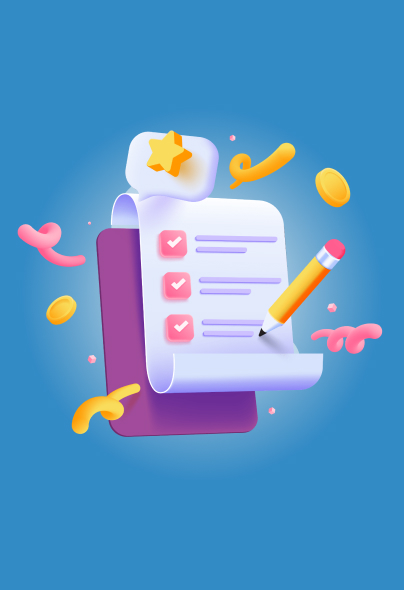The NDSS is administered by Diabetes Australia
- /
- Ready for adult care
As you grow up, you’ll start taking responsibility for your own health and healthcare. This includes making health choices, scheduling regular health checks, and talking with your doctor and other diabetes health professionals.
Moving to adult healthcare happens at different times. There’s no ‘set’ or ‘right’ time. Usually, it’s when you’re between 16 and 18, but it can be even later when you’re in your 20s.

When you’re young, your parents are usually in charge of your healthcare, scheduling appointments for you and keeping your diabetes supplies up to date. But as you grow up, you become responsible for your own healthcare. This means you can choose the care you need and make your own decisions about how to manage your diabetes.
It’s important to stay connected to diabetes health professionals during this transition time. Even though getting used to a new system and the added responsibilities may feel hard in the beginning. The aim is to stay as well and healthy as possible, now and in the future.
Becoming a young adult is an exciting time. There’s a lot to balance, including your study, job, social life, sport and any other hobbies or interests you might have.
It can be tough to juggle everything and it’s easy to let your diabetes management and health checks slip off the radar. But juggling the responsibilities of life and your diabetes is part of growing up. This is why it’s really important to stay connected to your diabetes health professionals during this time.
Why? Well, type 1 diabetes is a complex condition that can affect your body and your mind. Knowing how to look after yourself will decrease the risk of getting diabetes-related complications now and in the future. Plus, your diabetes health professionals can support you as you get used to managing your diabetes as a grown-up.
When you move to adult healthcare, you’ll likely have a new team of diabetes health professionals. They will talk to you directly about your diabetes care and management.
This can be a change from when your parents were in charge of your diabetes care and management. You might be responsible for making your own appointments, asking questions, and knowing your diabetes management targets.
To get ready for the transition, it’s a good idea to work out if there are parts of your diabetes management you’re not confident about. If you don’t know enough about a particular area of your diabetes management, that’s totally normal and okay. That’s what your diabetes health professionals are there for. It’s also okay to still get help from your parents or friends,or bring them to your appointments if you want. It’s up to you.
Remember, transitioning to adult healthcare is all about making sure you’re ready for the responsibility and have the care and support you need. It’s about developing the skills you need to manage your diabetes more independently as you grow up.
Are you ready to transition to adult care? Take the quiz to see how you’re tracking

What it is: A clinic for people aged 16 to 25, usually at a public adult diabetes service.
What’s the cost: This can be a public or private clinic, which affects the adult clinic cost.
What it is: A public hospital service for all adults (16 years and over) with diabetes.
What’s the cost: Medicare usually covers the costs of diabetes health professionals. Medicare also covers the costs of any pathology tests including the HbA1c.
What it is: Care that is provided by various diabetes health professionals, including endocrinologists and diabetes educators, dietitians, and psychologists.
What’s the cost: Medicare covers some of the doctor’s fee, but maybe not all. For specialists, the gap can be quite large. If your general practitioner (GP) has given you a Chronic Disease Management Plan or a Mental Health Treatment Plan, you may get a Medicare rebate from seeing some diabetes or mental health professionals. Private health insurance may also cover some of the costs of diabetes and mental health professional fees.
What it is: Your GP is your local doctor who can give you prescriptions for medications and referrals to diabetes health professionals.
What’s the cost: Medicare covers most of the cost of a GP medical visit, but there may be a gap payment (your contribution).
Take the online diabetes quiz to see how you rate on the transition to adult healthcare scale.
There are many apps that can help you manage your diabetes.
There are also apps that have bolus calculators and help with insulin to carb ratio, that work with blood glucose meters and CGM and Flash GM devices, and that are matched to specific insulin pump.
Stay on top of diabetes with the NDSS
You may want to update your details with the National Diabetes Services Scheme (NDSS). Once you’re 15 years you can update your details with the NDSS and become the primary contact instead of your parent or carer.
This means that you receive any communication about what’s available to you via the NDSS rather than your parents or carers. If you’re not sure about the NDSS, read the information below.


Are you planning on moving out of home soon? It’s important you know where to get your diabetes supplies! Go to healthdirect.gov.au to find a NDSS Access Point, usually a community pharmacy, near you.
Set up your My Health Record to access your health information online. Go to the Australian Digital Health Agency.
Quiz
This information is intended as a guide only. It should not replace individual medical advice. If you have any concerns about your health, or further questions, you should contact your health professional.


Time is Up!

Time's up